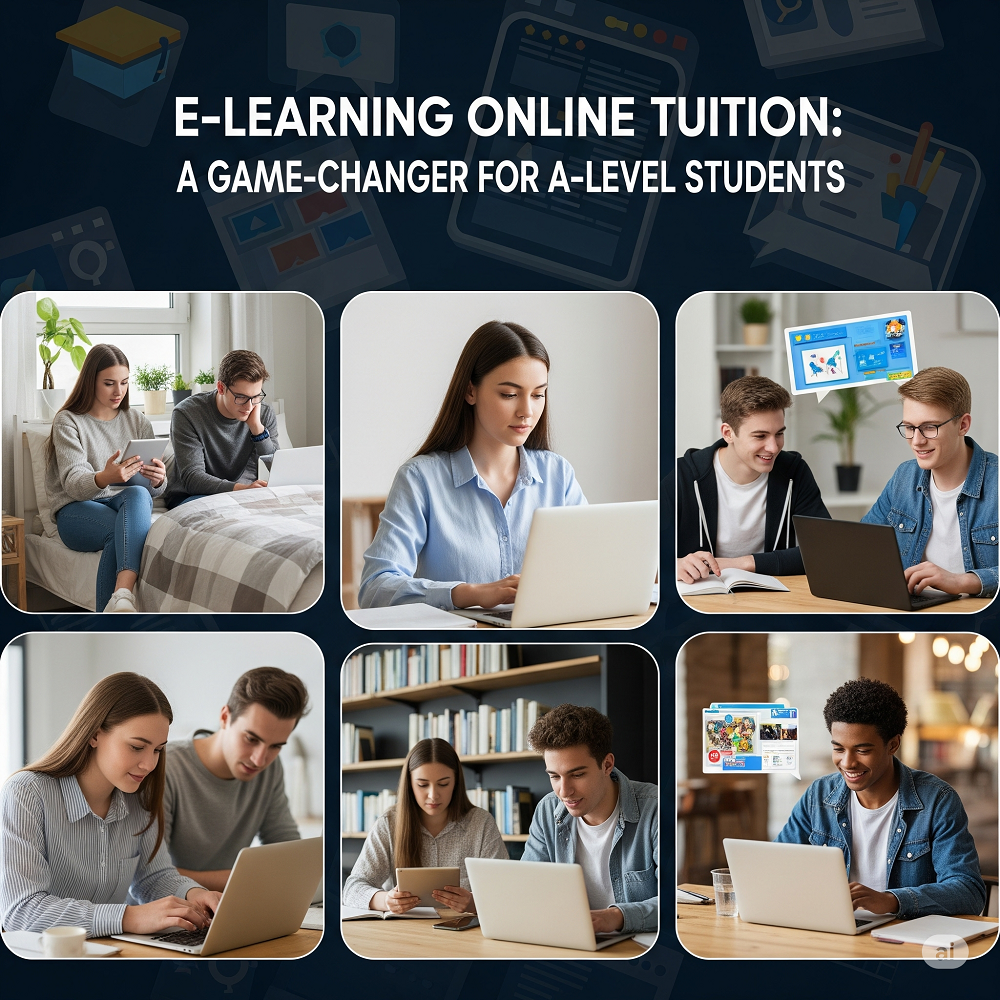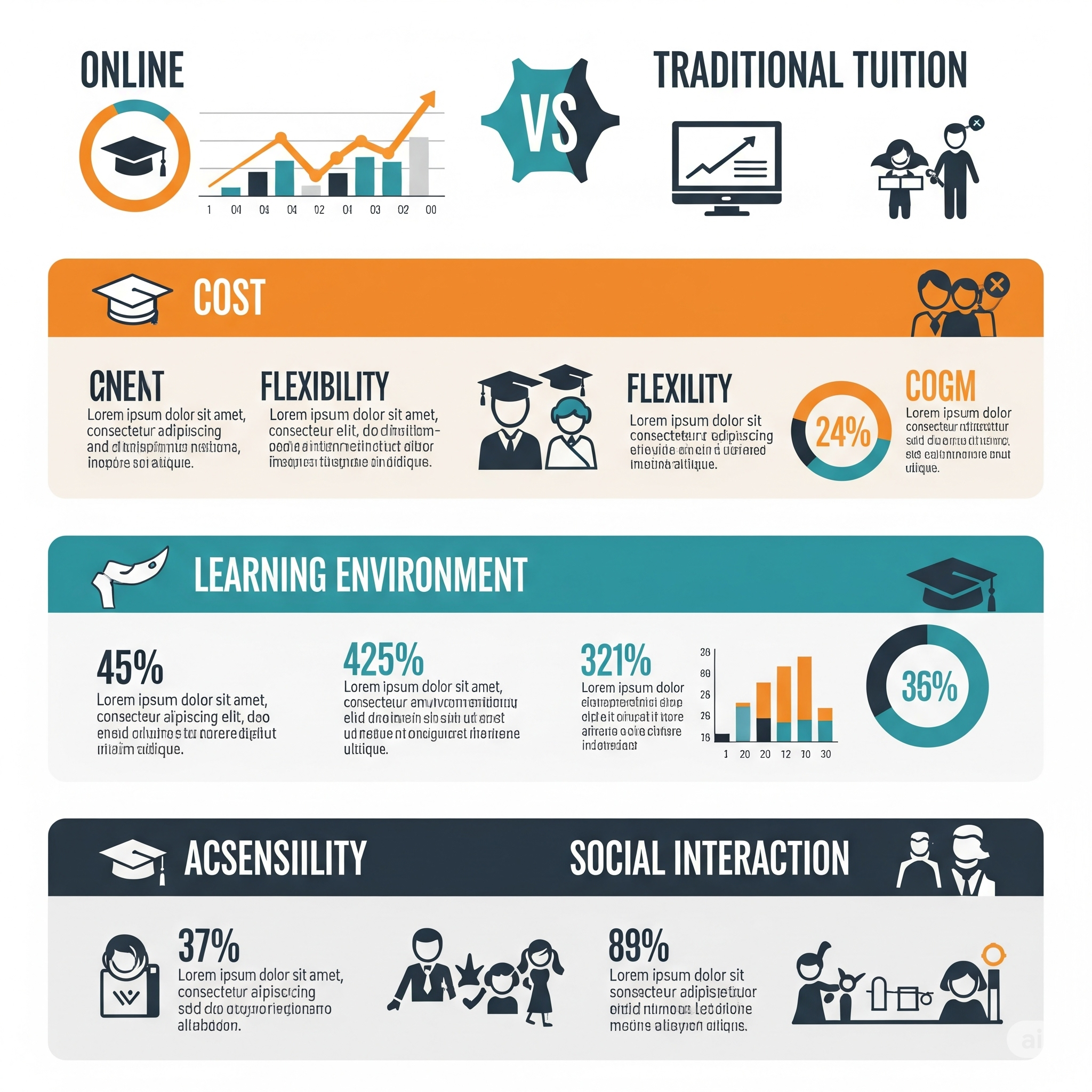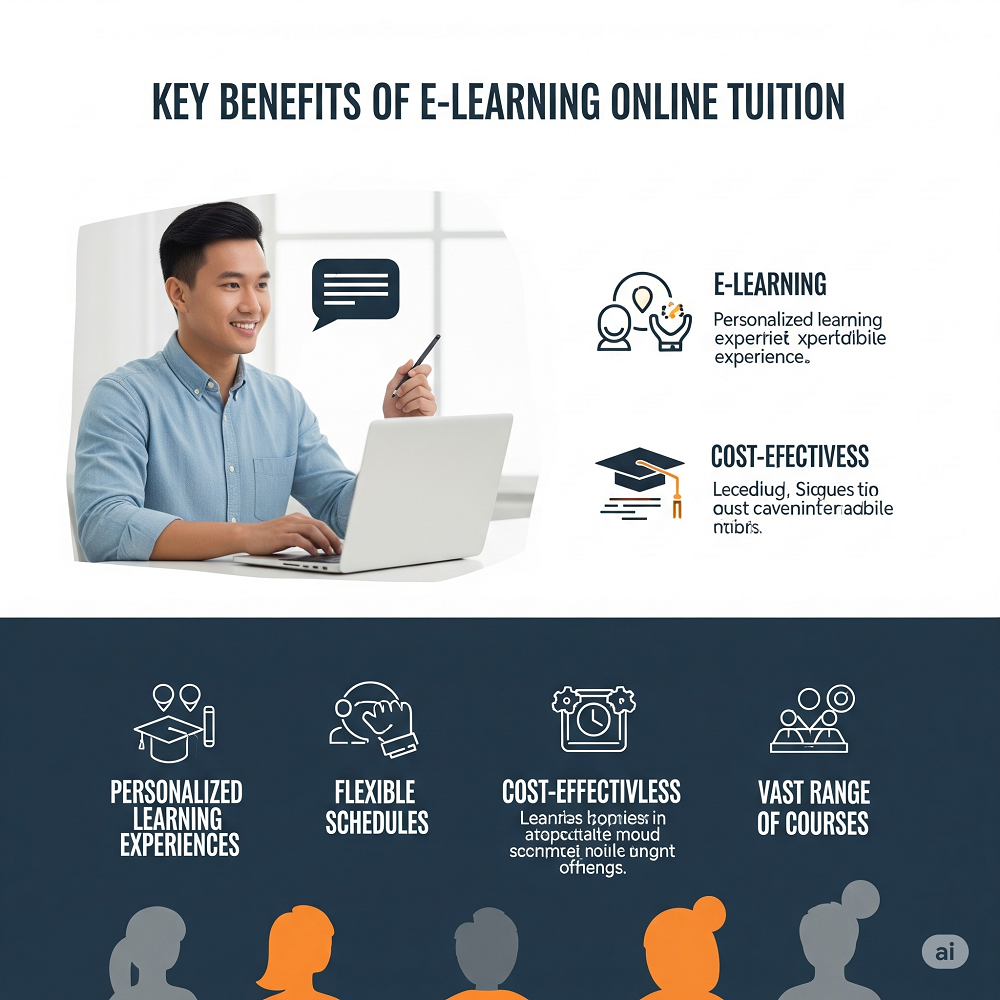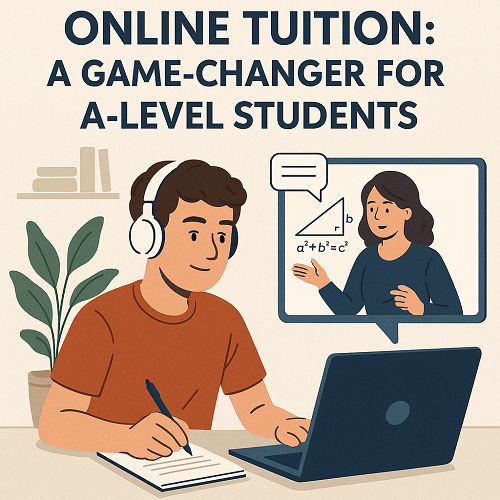HomeBlogsE LearningE-Learning Online Tuition: A G...
E-Learning Online Tuition: A Game-Changer for A-Level Students
Table of Contents
ToggleE-Learning Online Tuition: A Game-Changer for A-Level Students

Imagine the power of acing your A Levels with a personal tutor anytime, anywhere. In recent years, E Learning Online Tuition has revolutionized how students prepare for advanced exams. Instead of scheduling rigid in-person sessions, an A-Level student can join a live online session with a tutor thousands of miles away. Industry research shows this shift is massive: post-pandemic, nearly half of all private tutoring in the UK is now online, up from just 9% before 2019. Not only does e-learning online tuition break down geographical barriers, but it also often costs 20% less than traditional lessons. In the following sections, we’ll compare online versus traditional tuition, highlight key benefits like flexibility and personalized learning, and share fresh insights from recent studies and real experiences.
E Learning Comparing Online vs. Traditional Tuition

Key Differences: The table below shows how e-learning online tuition stacks up against face-to-face tutoring:
At Global Tutoring System, we’ve been at the heart of this shift for the last 10 years—guiding students from Boston to Birmingham, from Toronto to Texas. This blog explores the evolving landscape of E Learning in these countries, supported by real experiences, data, and strategies that actually work.
Scheduling Fixed slots, travel needed Flexible timing; lessons can be recorded and reviewed later
LocationLocal tutors only; commute required Global tutor pool; learn from home or anywhere
Cost Higher (travel fees, fixed rates) Often 20% cheaper (no travel costs)Tutor Selection Limited to nearby tutors Access to specialized, vetted experts worldwide
Learning Tools Mainly textbooks and blackboard Interactive multimedia (videos, quizzes, digital whiteboards)Comfort In-person setting Learn in a familiar environment; safer for anxious or shy students
Traditional tuition still offers face-to-face interaction, but it can be harder to coordinate schedules and find top tutors nearby. By contrast, online tutoring gives students 24/7 access to materials and experts. For example, one platform notes that recorded lessons mean students can “log in… at any hour of the day, without time restrictions”, fitting study around busy lives.

Flexibility and Convenience
Online tuition adapts to students’ lives. Whether balancing sports practice, part-time work, or family commitments, students can schedule sessions and even review recorded lessons later. For example, platforms let learners pause and rewind lessons as needed. A parent in the UK explained that with online tutoring, there was “no need to commute” and sessions could happen even while traveling, which was especially helpful when schedules got busy. This on-demand model keeps momentum: students are less likely to miss a session due to illness or traffic, and they can revisit tricky topics at their own pace.
Access to Expert Tutors Worldwide
One of the greatest advantages is the sheer choice of tutors. Online platforms vet and recruit qualified teachers and even PhD students from around the world. A-Level learners in Pakistan, for example, can easily find tutors specializing in UK curricula, and UK students can connect with international experts in niche subjects like A-Level Psychology. This global pool means students can find the perfect match for their learning style. Platforms often run diagnostics to pinpoint a student’s weak areas, then pair them with a tutor whose expertise directly addresses those topics. In short, online tuition brings together students and top tutors without the constraints of location, ensuring high-quality guidance for challenging subjects.
Personalized Learning Plans
E-learning tuition platforms typically start with an assessment to understand each student’s strengths and gaps. Tutors then craft individualized study plans: selecting past papers, tailor-made quizzes, and revision schedules. Unlike crowded classrooms, each session focuses on the student’s needs. Frequent testing and feedback loops mean students and parents see clear progress: one tutoring service reported its A-Level students had an 85% pass rate of A*-B grades in 2023. Personalization also extends to teaching style – tutors can adjust explanations on the fly. For example, if a student is a visual learner, a tutor might use animations or sketches on a digital whiteboard to explain complex biology concepts.
Engaging Technology and Tools
Online tuition uses multimedia tools that make learning more engaging. Live video calls replicate face-to-face interaction, while digital whiteboards and screen-sharing let tutors demonstrate problems step-by-step. Students can see physics simulations, annotate documents in real time, and even record lessons to rewatch. Many platforms include interactive quizzes and games to reinforce learning. These tools also support collaboration: for example, breakout “virtual rooms” can be used for group study or peer learning. In practice, this technology boost means students often find online lessons more interactive than traditional tutoring. Online tuition uses video calls and interactive whiteboards to deliver dynamic lessons (Image: Pexels)
Boosting Confidence and Performance
Beyond convenience, online tutoring has been shown to improve outcomes. Rigorous research, including a study by the Abdul Latif Jameel Poverty Action Lab, found that online tutoring programs significantly improved students’ learning outcomes and socio-emotional skills. Similarly, an Education Endowment Foundation pilot reported that 9 in 10 pupils felt more confident with their schoolwork after receiving one-to-one online tutoring. Students appreciate the judgment-free, one-on-one setting: with the tutor’s full attention, they can ask questions freely. Teachers noted this approach led to big jumps in confidence and attainment; one head of maths said personalized online maths tutoring made *“a huge difference in their confidence and attainment”*. These results suggest that beyond grades, online tuition helps build the motivation and self-belief students need to tackle exams.
Unique Insights and Tips
While the benefits are clear, making the most of e-learning online tuition requires savvy strategies. A good tip is to establish a routine: treat a virtual tutoring session like a regular class, choosing a quiet workspace and wearing headphones. Leverage the platform’s resources: many providers offer extra quizzes and forums for doubt-clearing between sessions. Parents report that setting clear goals each week keeps students motivated. As one testimonial put it, after online tuition her son “no longer worries as much” about his grades because consistent practice built his confidence.
Another insight: use the global advantage. If a particular tutor or time slot isn’t working, it’s easy to switch or try a session with someone in another time zone. Students should also communicate preferences (e.g. wanting more practice problems or visual explanations) to their tutor to make lessons more effective. Finally, don’t underestimate accountability: unlike passive videos, live tutoring ensures the student stays engaged. In fact, online courses with real-time coaching boast completion rates above 70%, compared to only 10–15% for self-paced courses. This means that when a student books a live online session, they’re far more likely to stick with it and see results.
Conclusion
E Learning Online Tuition offers A-Level students a flexible, personalized way to excel. By combining expert tutoring with the latest technology, students overcome traditional barriers of location and scheduling – often at lower cost. As research confirms, this model not only boosts grades but also learner confidence.
This in-depth look at E Learning Online Tuition for A-Level learners drew on recent studies and expert opinions. By blending credible data with practical tips and real stories, we hope you now see why online tuition is truly a game-changer.
🌍 The Rise of E Learning: Why It Matters More Than Ever
E Learning—the use of digital technologies to deliver education—has become a central pillar in modern learning systems. Initially accelerated by the COVID-19 pandemic, its growth continues to skyrocket because of:
- Flexibility: Learn anytime, anywhere.
- Accessibility: Reach top-tier tutors and resources regardless of location.
- Personalization: Tailor-made learning paths, adaptive technologies.
- Cost-effectiveness: Eliminate commuting and reduce institutional overheads.
According to Statista, the global E Learning market is projected to exceed $400 billion by 2026, with North America and Europe contributing the largest shares.
🇨🇦 Canada: Collaboration, Quality & Northern Connectivity
Canada emphasizes quality and accessibility, backed by strong provincial systems and government initiatives like CanCode. Key traits:
National Standards: Bodies like eCampusOntario ensure rigorous online course quality.
Rural Focus: Provinces invest in connectivity for remote communities (e.g., BC’s Connected North).
Bilingual Demand: E-learning must navigate English/French delivery seamlessly.
GTS Insight: Canadian learners prioritize accredited programs and value collaborative online tools. We’ve seen surging interest in STEM and language courses (especially French immersion support).

The UK embraced e-learning early, accelerated by the pandemic. The Office for Students (OfS) now strictly regulates online degree standards. Trends include:
Vocational Surge: Platforms like FutureLearn (partnering with UK unis) offer job-focused microcredentials.
AI Integration: Tools like Century Tech use AI for personalized school learning paths.
Cost Pressures: Students demand clear ROI as tuition fees rise.
GTS Insight: UK learners are highly discerning. Our A-Level and GCSE tutoring thrives when combining structured curricula with real-time tutor engagement and exam strategy.
Market Comparison at a Glance
Region2024 Revenue (USD)Projected CAGRKey StatUSA$39.6 billion (online education market) brighterstridesaba.com9.1% to 2026 en.wikipedia.org43% global share of e‑learning spendCanada$22.0 billion (e‑learning services) grandviewresearch.com20.7% (2025–2030) grandviewresearch.com94% of institutions offering hybrid courses grandviewresearch.comUK$11.8 billion (e‑learning services) grandviewresearch.com17.1% (2025–2030) grandviewresearch.comUK ≈ 3.9% of global e‑learning marketGlobal Tutoring$10.42 billion (online tutoring) grandviewresearch.com14.5% (2025–2030) grandviewresearch.comExpected $23.73 billion by 2030

Find expert tutors & live online classes tailored for students in USA, UK & Canada. Top-rated e-learning platform with flexible tuition options.
Learn from home with certified online teachers. Trusted by students across the USA, UK & Canada for A-Level, GCSE, SAT & Quran tuition.
Discover the best virtual learning experience with personalized online tutoring, live classes, and flexible scheduling in USA, UK & Canada.
Engagement Isn’t Optional: Passive video lectures fail. Polls, breakout rooms, and gamification (like badges) are essential.
Cultural Nuances Matter: A study schedule that works for a London professional might overwhelm a rural Canadian student. Flexibility is key.
Trust is Built in Real-Time: Quick tutor feedback (under 24 hours) dramatically boosts confidence and retention.
Region | 2024 Revenue (USD) | Projected CAGR | Key Stat |
|---|---|---|---|
USA | $39.6 billion (online education market) globaltutoringsystem.com | 9.1% to 2026 en.wikipedia.org | 43% global share of e‑learning spend |
Canada | $22.0 billion (e‑learning services) globaltutoringsystem.com | 20.7% (2025–2030) globaltutoringsystem.com | 94% of institutions offering hybrid courses globaltutoringsystem.com |
UK | $11.8 billion (e‑learning services) globaltutoringsystem.com | 17.1% (2025–2030) globaltutoringsystem.com | UK ≈ 3.9% of global e‑learning market |
Global Tutoring | $10.42 billion (online tutoring) globaltutoringsystem.com | 14.5% (2025–2030) globaltutoringsystem.com | Expected $23.73 billion by 2030 |
GTS at 10: Lessons from the Digital Classroom Trenches
Teaching 50,000+ students across these nations taught us invaluable lessons:
Engagement Isn’t Optional: Passive video lectures fail. Polls, breakout rooms, and gamification (like badges) are essential.
Cultural Nuances Matter: A study schedule that works for a London professional might overwhelm a rural Canadian student. Flexibility is key.
Trust is Built in Real-Time: Quick tutor feedback (under 24 hours) dramatically boosts confidence and retention.
One of our biggest ‘aha!’ moments was realizing an Ontario student struggling with calculus needed different scaffolding techniques than a peer in Texas, despite using the same platform. E-learning isn’t one-size-fits-all – it’s personalized education at scale.”
– Sarah Chen, Head of Pedagogy, Global Tutoring System
Your Learning Journey Starts Here
The e-learning revolution isn’t slowing down. Whether you’re a US professional seeking a promotion, a Canadian student mastering French, or a UK learner prepping for crucial exams, the digital classroom is open.
Ready to experience the difference a decade of expertise makes?
At Global Tutoring System, we blend cutting-edge platforms with human-centered teaching honed over 10 years across three nations.
Discover personalized tutoring designed for your goals, in your timezone. Explore GTS Programs Tailored for You
🧭 Why Global Tutoring System?
Unlike generic platforms, Global Tutoring System offers:
🎓 10+ Years of Experience Across Three Countries
💼 Certified, Culturally-Competent Tutors
🔁 Flexible Schedules to Suit All Time Zones
📈 Data-Driven Results & Parent Involvement
🌐 A Learning Ecosystem That Feels Like Home—Anywhere in the World
